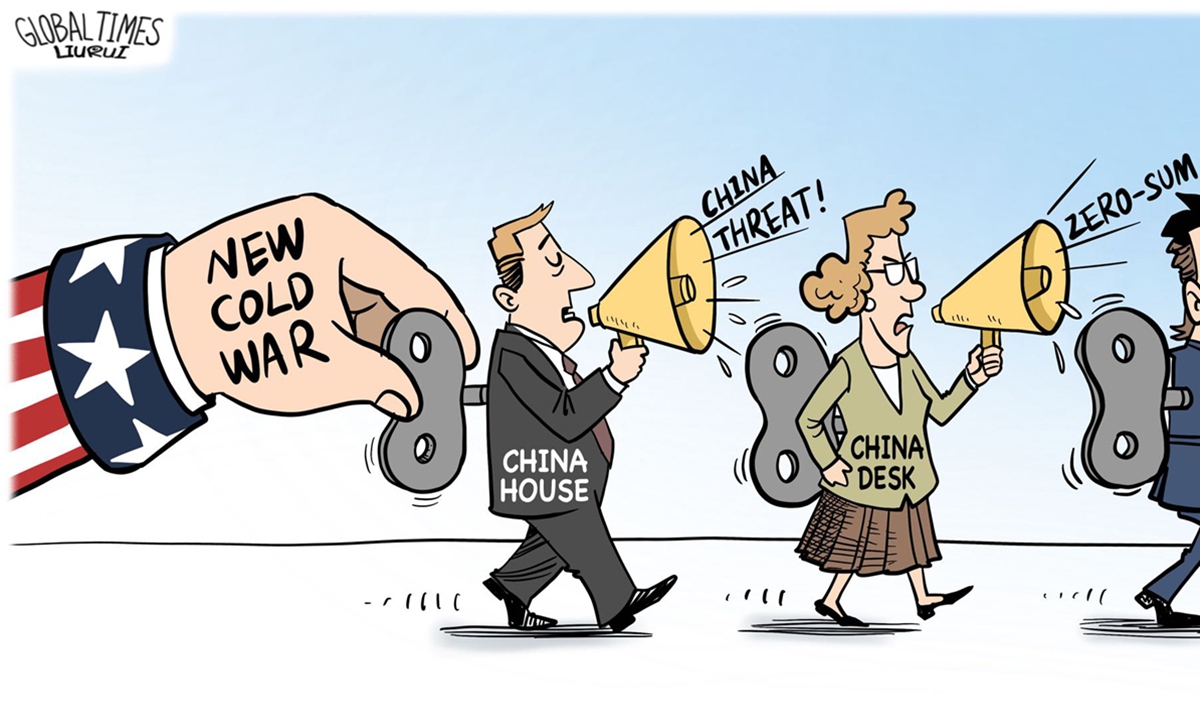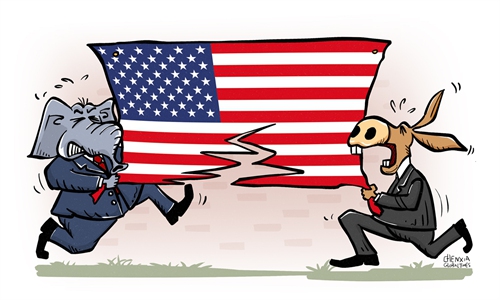US needs effective communication rather than self-talk to improve relations with China

US China new cold war Illustration: Liu Rui/GT
Recently, the US has continued to unilaterally release news about US Secretary of State Antony Blinken's potential visit to China on June 18. Media outlets worldwide have shown obvious expectations for Blinken's trip and a stable China-US relationship.
As China has repeatedly emphasized and made clear, China-US ties should return to a healthy track, and the facts prove that China has always maintained a consistent and responsible attitude toward the bilateral relationship throughout history. The derailed state of China-US relations mainly results from the US' repeated and unnecessary "tossing" on the Taiwan question and other issues. To bring the bilateral ties back to benign development, responsible moves from the US side are needed to put its commitments into practice and install the so-called guardrails.
A new phenomenon in the current relationship between Beijing and Washington is that the US administration is increasingly presenting puzzling self-talk. It seems as if, with "virtual reality eyes" framed by US ideology and domestic politics, politicians are deeply immersed in a virtual scenario, taking pre-determined actions.
On the one hand, the US constantly expresses strong signals for communication with China at various levels. On the other hand, the US has continued to act in the opposite direction, which includes proposing new lists of sanctions, making negative manipulations of unexpected events that damage China-US relations before high-level officials' visits, and sending signals immediately after the visits that stand contrary to its promises. The US has also unilaterally pressured China on the Taiwan question, trade and high-tech issues, provoking China's core national interests, and even disrespecting or impinging on the red lines of China's national interests.
This inherent contradiction, to a considerable extent, leads to ineffective communication between the US and China, which does not benefit China-US ties but further diminishes mutual trust. It must be said that such irresponsible actions from the US have caused and continue to cause serious damage to bilateral relations.
In particular, it should be noted that the US has a significant comparative advantage in refining concepts, shaping perceptions, and setting up media propaganda. However, when this advantage is combined with excessive political motivation, there is an objective trap of "virtual perception."
For example, Aaron Wess Mitchell, a former US diplomat, published an article titled "Why Biden's China Reset Is a Bad Idea." Frankly speaking, this is a way to "force" the real situation of China-US relations into the so-called "reset" framework; it is a discussion based on assumptions and imagination.
For one thing, the China-US relationship has not reached a stage where it needs to be fully "reset." For another, from China's perspective, the current US administration has not taken any significant and substantive steps that can be considered a "reset" of the relationship.
Prior to Blinken's possible upcoming visit to China, the US began to hype up the so-called spy base in Cuba, which is quite inexplicable. This has worried researchers who have observed China-US relations over the long term, as it raises concerns about whether the US is capable of breaking free from a development process dictated by its ideology and domestic politics. Even if Blinken visits China, the process will highly likely be a repetition of the one-way communication that has previously proven ineffective and is based entirely on the US' self-centered imagination.
In this way, the US will exert pressure on China during the talks, which is not only a waste of time, but also erodes China's goodwill and patience. It is unlikely to produce positive results and may lead to pessimism about the future of China-US relations, as well as doubts about the current US administration's ability to handle bilateral ties effectively.
Compared to the US, China's attitude has been clear, pragmatic and responsible. As China has repeatedly stated, the US should assume its responsibility in improving bilateral relations. The key to whether China-US relations can really have a thaw lies in the hands of the US rather than China. If Blinken hopes to make progress, then he must stop engaging in self-talk, face up to reality, carry out effective communication, fulfill commitments, and take visible and responsible actions to push China-US relations toward a healthy track. All parties are waiting to see what happens.
The author is director of the Centre for Cyberspace Governance Studies, Fudan University. opinion@globaltimes.com.cn

